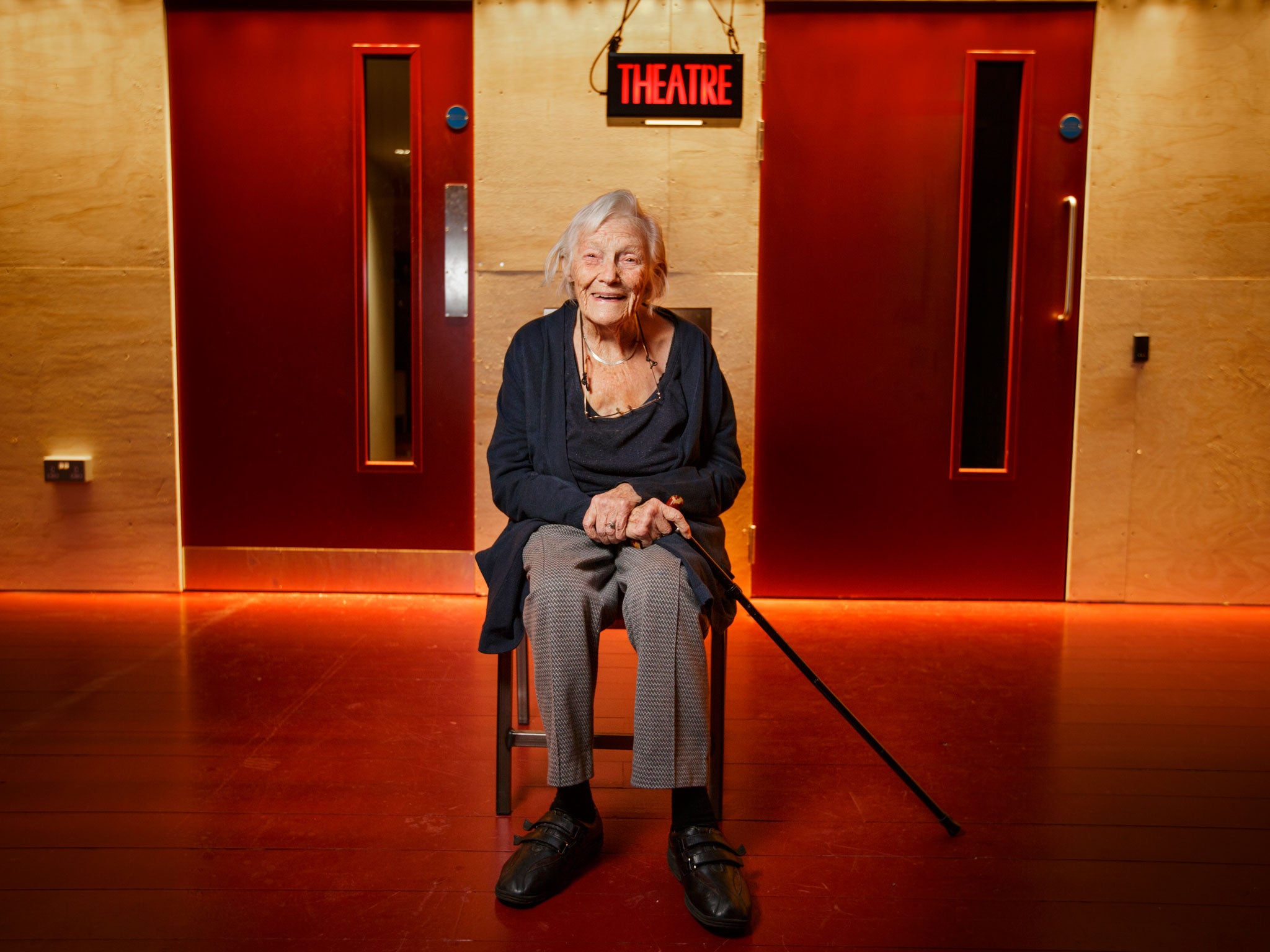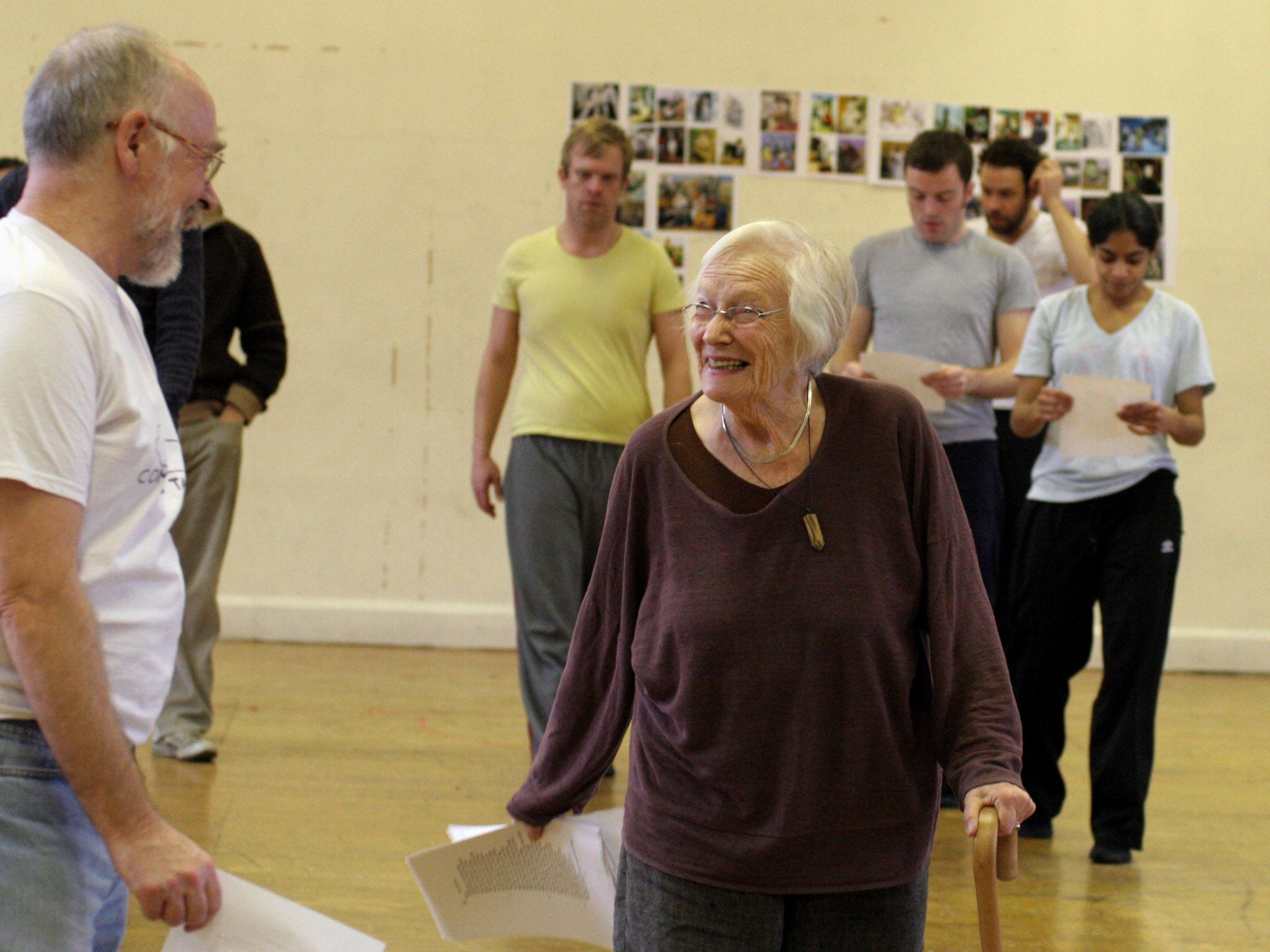Cicely Berry interview: The RSC's formidable voice coach reveals how to capture the sound of Shakespeare
When even the greatest actors tackle Shakespeare, they have to ask themselves, how am I supposed to speak this stuff? That's where the legendary RSC voice coach Cicely Berry comes in. Oscar Quine meets her

Your support helps us to tell the story
From reproductive rights to climate change to Big Tech, The Independent is on the ground when the story is developing. Whether it's investigating the financials of Elon Musk's pro-Trump PAC or producing our latest documentary, 'The A Word', which shines a light on the American women fighting for reproductive rights, we know how important it is to parse out the facts from the messaging.
At such a critical moment in US history, we need reporters on the ground. Your donation allows us to keep sending journalists to speak to both sides of the story.
The Independent is trusted by Americans across the entire political spectrum. And unlike many other quality news outlets, we choose not to lock Americans out of our reporting and analysis with paywalls. We believe quality journalism should be available to everyone, paid for by those who can afford it.
Your support makes all the difference.Of the backstage cast of characters in Shakespearean theatre over the past six decades, there are those preceded by their reputations – and then there is Cicely Berry.
The Royal Shakespeare Company's first voice director, she held the appointment for an astonishing 45 years – from 1969 to 2014, but she still contributes her services – during which time she was as much feared as she was feted. "So bloody honest and so bloody demanding," Emily Watson said of her. "Straight out of central casting; a complete bloody tyrant," said Neil Kinnock, whom she trained in public speaking. I'm told not to expect an easy interview, a point driven home when my idea to have Berry demonstrate some of the unconventional techniques for which she is known is rejected. She's done all that before, I'm told and does not wish to "blow her own trumpet".
Thanks in part to her idiosyncratic ways, Berry's career has been marked by a near-magical ability to unlock actors' true voices. One actor was instructed to kick a beer can around the rehearsal room while reciting his lines; another to look out of the window and draw what he saw as he spoke. She has thus helped perfect the vocal depth, breadth and sibilance of Sean Connery, Samuel L Jackson, Helen Hunt, and many many more.
While her accomplishments are grand, her physical presence is positively diminutive. We meet in a very small side office at The Other Place, an RSC black box theatre in Stratford-upon-Avon that is currently undergoing renovation. She is sitting in a chair, balancing her walking stick across the cupped palms of her hands. In May, she will turn 90. As she reaches out a hand to shake mine, her face breaks out into a bright smile that is most undragonlike.
My slight anxiety at sitting face to face with this grande dame is compounded by my shaky grasp of the subject matter, courtesy of a largely uninterested, overstretched comprehensive school English department. It seems best to address this elephant in the room. So, straight off the bat: what for Berry is the big deal with Shakespeare? Not to be facetious – obviously there is one – but just to hear it in her own words.
Berry's response focuses unwaveringly on what she knows: the component sounds of Shakespeare's language. "The extraordinary thing about Shakespeare is that he somehow wrote in the rhythm of how people think," she says in a slow, measured voice. "If you think about it, the number of phrases in everyday speech that come from Shakespeare is quite extraordinary."
This longevity, she believes, can be credited to the perfect marriage of sound and substance in Shakespeare's best phrasing. "Somehow all the sounds that Shakespeare uses are integral to the meaning. That's why you have to capture the very sound of Shakespeare to fully understand the feelings underneath."
At moments when she struggles to recall lines, Berry will chastise herself for not having brought "her Shakespeare" with her. But here a quotation rolls off the tongue. "It's like a line of Ophelia's. She's thinking of Hamlet, after a dialogue with him where he has been really unfeeling to her, and she says, 'Oh, what a noble mind is here o'erthrown'. She's absolutely ravished by what she's been through. Those sounds – ooohh – reflect that she is keening for him. It's totally subconscious."
If anyone knows the power that can be packed into the raw syllables of Shakespeare, it is Berry. Appointed by Trevor Nunn, she has honed the vocal delivery of every RSC star going. When I ask if there is anyone she wishes she had worked with, she replies with a wry laugh: "No, not really. I worked with them all." Despite official retirement two years ago, she says she still comes in to the RSC offices most days.
Her extraordinary reputation is built on an impressive legacy. Berry forever changed the way Shakespeare is spoken on stage. Her revolutionary approach was to teach that Shakespeare comes as much from the gut as the head. A desire to disconnect the primacy of the mind over the spoken language, she says, lies behind her rehearsal techniques.
"What I feel goes so wrong when people are rehearsing anything, but particularly Shakespeare, is that you sit around and read it as a cast. You discuss all the meanings, and it is sometimes quite difficult to find the exact meaning. But you are making it literal all the time, keeping it at the forefront of your mind.
"I began to realise that that had a huge effect on the sound itself. While the actors would think of the meaning, they were not aware of the sounds that were being used and how those sounds affect how they feel and how they think. I began to, just out of frustration really, get actors to work on a speech and walk around saying the speech, meaning it, thinking it through, and kicking something, or bumping into somebody, or making things difficult, to see how that releases somehow another understanding of the language. Because they're not making it sound right, they're reacting to what I've asked them to do."

So has the sound of Shakespeare changed a great deal in her time? "Yes, I think so," Berry says. "When I started working, I think actors felt they had to make it sound poetic and beautiful all the time. Now, we don't want that. Actors today have a very difficult job. We don't want to hear Shakespeare spoken as it was even 20 years ago: we want to hear it spoken for now so that we can get involved in the stories that are still happening in their different ways. And yet we still want all those sounds which are integral to the meaning to come through. It's a tricky mix."
Here, she defers to Edith Evans – one of the theatrical greats of the 20th century – and her theory of poises. "She would say there's never a pause in a Shakespeare speech, but there are poises," Berry explains. Poises are imperceptible delays added to words to give them a little more space and imbue them with added tension. It is an approach that separates rhythm from meter. "It's not about getting the sounds over by making them sound beautiful," Berry explains. "It's about giving them space."
"With actors, I beat out a speech, and see how the underlying meter is always there. Like it is if you're singing reggae, there's a beat underneath it – but what you do on top of that beat can be anything. You could do Shakespeare reggae really."
Aside from the mischievous notion of fusing Bob Marley with the Bard, Berry is here breathing life into one of those most hackneyed of phrases: "Shakespeare is alive." She is adamant that his plays remain universally relevant. "The more you work on Shakespeare, the more you realise he expresses very deep feelings in all of us. It's not to do with being educated or clever or whatever that means. It's to do with a true understanding of how people think and how that makes them act and do things."
Join our commenting forum
Join thought-provoking conversations, follow other Independent readers and see their replies
Comments